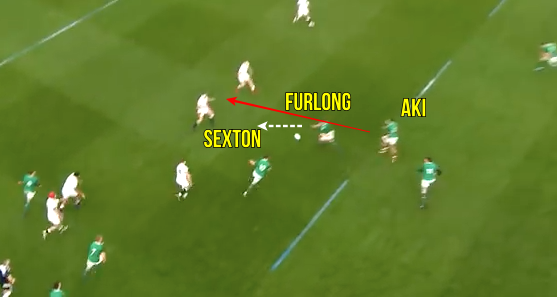

Share
12th May 2020
06:06pm BST

The amended law will now read - The post protector is no longer an extension of the goal-line. Therefore Law 8.2 (a) will read: A try is scored when the attacking player a) is first to ground the ball in the opponents' in-goal.Re-elected World Rugby chairman Bill Beaumont says the law has been changed to help 'make the game as simple, safe and enjoyable to play as possible'. Tries like that CJ Stander score against England in 2018 are now a thing of the past. So, if you will indulge us, let us hark back to that game-breaker against Eddie Jones' men on St Patrick's Day. [caption id="attachment_211434" align="aligncenter" width="765"]
 Credit: Guinness Six Nations (via YouTube)[/caption]
Referring to the superb play involving Bundee Aki, Tadhg Furlong and Johnny Sexton for CJ Stander's try against England, former Leinster and Ireland star McLaughlin told us:
Credit: Guinness Six Nations (via YouTube)[/caption]
Referring to the superb play involving Bundee Aki, Tadhg Furlong and Johnny Sexton for CJ Stander's try against England, former Leinster and Ireland star McLaughlin told us:
"They [the Irish management] will understand, based on the data they collect from games, what the intensity is going to be like and they'll try to replicate that. "And the second thing is, Joe will put incredible pressure on them. He creates a pressure cooker in training so they get used to it in matches. "For instance, that Tadhg Furlong play that resulted in the CJ Stander try, they would have had one opportunity to run that, on the Thursday, in training. If they mess it up, they don't get another opportunity."
 "His philosophy," McLaughlin continued, "would be - 'You do your work, you do what you need to prepare mentality, you can run through it in the gym before training, but you get one chance'. That's the pressure that he puts them under in training.
"Because England are not going to say, 'Oh, you messed up. Go back and do the lineout again. Try get it right next time'. That creates huge pressure."
Decision-making and being clinical under pressure.
"That's Joe Schmidt down to a tee," McLaughlin added. "I've never seen anyone else analyse a team in greater detail than him."
"His philosophy," McLaughlin continued, "would be - 'You do your work, you do what you need to prepare mentality, you can run through it in the gym before training, but you get one chance'. That's the pressure that he puts them under in training.
"Because England are not going to say, 'Oh, you messed up. Go back and do the lineout again. Try get it right next time'. That creates huge pressure."
Decision-making and being clinical under pressure.
"That's Joe Schmidt down to a tee," McLaughlin added. "I've never seen anyone else analyse a team in greater detail than him."
Explore more on these topics: